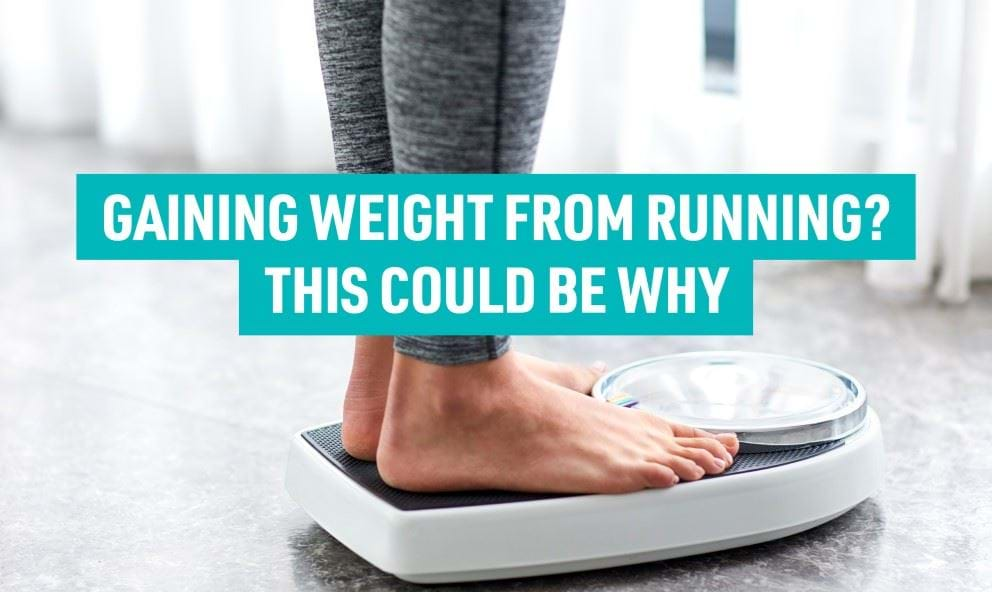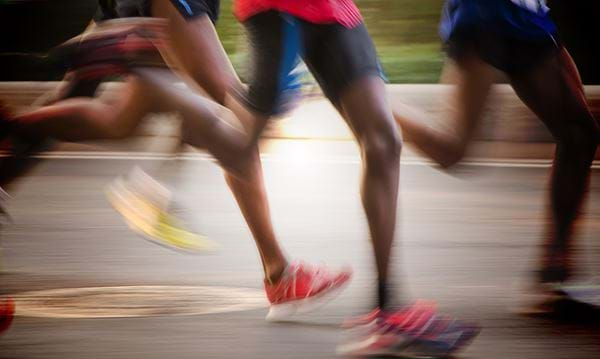Gaining Weight From Running? This Could Be Why

Running is a budget-friendly, easily accessible and fun form of exercise, so there’s no surprise that it’s one of the most popular ways to work out. In fact, as we discovered in our trends report, the treadmill is the most popular piece of cardio equipment in the gym. Not only can running help boost fitness and wellbeing, but it’s also an excellent way to burn calories and support weight control.
However, it’s not unheard of for runners, particularly beginners, to actually gain weight or put on fat, despite this additional energy burn.
Here, PureGym PT and runner Chris Collett explains what could be causing this surprise weight gain, as well as some top tips to prevent this from happening.
5 Reasons You Could Be Gaining Weight From Running
-
Your appetite has increased.
Running is a physically demanding activity, and every time you head out on a run you increase your body’s energy expenditure (calories burnt) for that day.
Some people find their appetite increases when they start running, and it can be easy to unintentionally consume more calories than they burn, leading to weight gain. One reason for this is that runners overestimate how many calories they have burnt and overcompensate by eating high calorie foods to satisfy their hunger, or rewarding themselves after every run. Another reason is that their overall daily expenditure has gone down (which we cover more in the next point).
While it’s important to eat enough food to fuel your runs, you don’t need to carb load or eat a lot of additional food if you are running short distances (up to 10k or 70 minutes). This will be quite different if you’re running longer distances like a marathon or ultra-marathon, where you’ll need to supply your body with plenty of high-energy foods. We cover diet and nutrition for marathon runners here.
-
You’re not moving as much.
Exercise only makes up a small amount of the total calories people burn each day. Around 15-30% of the calories you burn come from NEAT (non-exercise activity thermogenesis), which is any movement you do that isn’t sleeping, eating, or exercise, such as shopping or taking the stairs.
Often, as exercise goes up, people unintentionally move less throughout the day. This is the body’s way of levelling out the excess energy used during your runs. People often do not realise that they are moving less throughout the day and that their calorie expenditure has stayed the same or even decreased, so may be overeating as a result, leading to gain weight.
-
You’re retaining water.
If you’ve noticed the scale weight shoot up within the first few weeks of running, it may be from water retention rather than fat gain.
Starting a new exercise routine, like running, can cause temporary water retention in your muscles. As you place new physical stress on your body through increased exercise levels, your muscles can cling on to water to help the recovery and repair process. This is usually a short-term effect and will normalise as your body adapts to your new routine.
Dehydration can lead to or increase fluid retention, as the body holds on to more water when it is dehydrated. Properly hydrating before, during, and after your runs will help to minimise water retention.
-
You’ve gained muscle.
When you’re new to exercising, your body adapts to meet the demands of an increase in physical activity. Running engages a range of lower body muscles, including the quads, hamstrings, calves, and glutes, and some people will build leg muscle when they start running. While this is great for improving overall strength and fitness, an increase in muscle can cause an increase on the scales even though you haven’t gained fat.
-
You’re not allowing your body to recover.
Introducing any new exercise routine can temporarily stress the body, causing the release of the stress hormone cortisol. High cortisol levels can lead the body to store excess fat, particularly in the abdomen. It can also contribute to inflammation and water retention which will further increase your weight.
Stress levels should normalise quickly after starting a new exercise routine when you are allowing your body to fully rest and recover. If you are constantly working out, especially without building up the level slowly, your body will have less downtime to return cortisol levels to normal.
Skipping out on rest days can also negatively affect your energy levels, further decreasing your NEAT and even affecting your runs so that you burn fewer calories on each run.
Proper recovery through post-run cool downs, as well as including regular rest days is an important way to keep your body functioning well and your energy levels up.
We explain the importance of rest days here, so make sure you’re including them in your running plans. However, rest days don’t mean being entirely sedentary - you can still go for a walk, enjoy some yoga or pilates or work on strengthening your core.
Tips For Avoiding Weight Gain When Running
It can be frustrating seeing weight gain when you’ve started running, especially if you have a weight loss goal! It’s important to remember that weight gain doesn’t necessarily mean fat gain, and any weight gained as a result of inflammation or water retention will likely drop back after a few weeks.
If you have gained some fat while running, it’s likely down to eating more calories than you burn (whether that’s from eating more food, or moving less), which is simple to fix. For more information, you should check out this running for weight loss guide, but some top tips for preventing weight gain from running include:
-
Don’t go all in at once.
It can be tempting to go from zero to a hundred when starting running but this is more likely to play havoc on your hunger, stress, and energy levels, all which can contribute to weight gain.
Start by making a plan, and gradually increasing the duration, distance and frequency of your runs week on week. By pacing your progress gradually, rather than pushing too hard too fast, you can maintain energy levels and decrease the risk of fatigue and over-eating.
Check out some of the running plans below for an idea of how to begin running in a healthy, consistent way:
-
Track your food intake.
If you find you’re gaining unwanted weight, try tracking your calories or keeping a food diary to see if this is from overeating. If you’re tracking your calories, you’ll need to work out your TDEE (total daily energy expenditure) first, so that you can eat around (to maintain your weight) or less (to lose weight) than this.
When working out your daily calories, do not add the calories burnt from your runs, as this should be included already in your TDEE. It’s also worth noting that smart watches aren’t always accurate when it comes to tracking how many calories you burn during exercise and can overestimate how much energy you’re using. So it’s best not to rely on these too heavily when working out your daily calorie goals.
You can learn more about how many calories you should be consuming to lose weight here.
-
Make healthy food swaps.
If you find your appetite has increased from starting running, making healthy food swaps can be a good way to satisfy your appetite without increasing your calories too much. Add more lean protein and veg to your meals so that they keep you fuller for longer, swap calorie dense snacks for low calorie, high volume foods like fruit, and make sure you are eating a balance of protein, complex carbs, and healthy fats throughout the day.
-
Don’t under eat.
While it’s tempting to drastically cut your calories to lose weight, extreme dieting and fast weight loss is less sustainable in the long run and more likely to lead to fatigue, loss of motivation, and yo-yo dieting. A modest calorie deficit is the best way to lose weight while eating enough food to help fuel and recover from staying active.
-
Keep hydrated.
Drinking plenty of water each day will help to minimise water retention from running, and can also help to keep your hunger and energy levels topped up, as dehydration can sometimes feel like hunger. Rather than waiting until you feel thirsty to drink, take sips regularly throughout the day and aim for 2 litres of water. IF you sweat a lot during your runs, topping up your electrolytes with sports water can help to rehydrate. You can find more tips for staying hydrated while exercising here.
-
Don’t just focus on the scales.
There are a number of reasons your weight can fluctuate, from starting an exercise routine to having dinner later than normal. An increase in your weight on the scale doesn’t always mean you have gained fat, and it’s possible to lose fat without seeing big decreases in weight. If your goal is to lose weight, we recommend tracking your progress in multiple ways including weight, taking pictures, and tracking your body measurements.
If you’re just getting started with running, we recommend reading our Running FAQs guide. For more tips and advice for body reconditioning, you can also check out our weight loss hub here. When you’re ready to get started you can find your nearest gym here.


